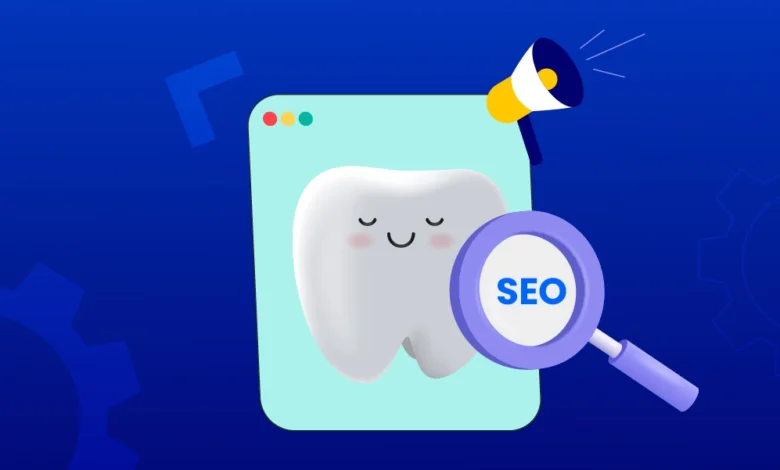How Dental SEO Services Can Drive More Traffic and Appointments

Understanding the Basics of Dental Marketing
What is Dental Marketing?
Dental marketing is all about connecting with potential patients and keeping your current ones engaged. It involves using various strategies to make sure people know about your dental services. This could be through online ads, social media, or even good old-fashioned word-of-mouth. The goal? Get more folks into your dental chairs.
Importance of Dental Marketing
Why bother with dental marketing? Well, it’s simple. If people don’t know about your practice, they can’t become patients. Dental marketing is essential for building a strong patient base. It helps you stand out in a crowded field and keeps your appointment book full. Without it, you might find yourself with more empty slots than you’d like.
Key Components of Dental Marketing
When it comes to marketing for dentists, there are a few key things to focus on:
- Online Presence: This includes your website and social media profiles. They need to be up-to-date and user-friendly.
- SEO (Search Engine Optimization): Helps your practice show up in search results when someone looks for a dentist online.
- Patient Reviews: Encourage satisfied patients to leave positive reviews. They can make a big difference.
In today’s digital age, having a solid dental marketing strategy is not just a nice-to-have; it’s a must. It’s about making sure that when someone needs a dentist, your name is the first one they think of.
The Role of SEO in Dental Marketing
How SEO Enhances Visibility
In the world of dental marketing, SEO acts as a beacon, guiding potential patients to your practice. When someone types “dentist near me” into a search engine, dental SEO services work behind the scenes to make sure your practice pops up. Being visible online is not just about having a website; it’s about being found when it matters most. With SEO, your dental practice can climb the search engine ranks, putting you right in front of those actively looking for dental services.
SEO vs. Traditional Marketing
Traditional marketing methods, like print ads and direct mail, have their place, but they can’t match the reach and precision of SEO. While a billboard might catch a few eyes, SEO targets individuals specifically searching for dental services. Here’s a quick comparison:
| Feature | SEO | Traditional Marketing |
| Targeting | Specific keywords and demographics | Broad audience |
| Cost | Often more cost-effective | Can be expensive |
| Measurability | Easily trackable | Harder to measure |
| Engagement | Interactive and ongoing | One-time interaction |
Benefits of SEO for Dental Practices
SEO offers a treasure trove of benefits for dental practices.
- Increased Traffic: More visitors to your site means more potential patients.
- Higher Conversion Rates: SEO attracts people who are already interested in dental services, making them more likely to book an appointment.
- Cost Efficiency: Unlike paid ads, organic traffic doesn’t incur costs per click, making it a sustainable marketing strategy.
SEO isn’t just about getting more clicks; it’s about getting the right clicks. By focusing on SEO, dental practices can ensure they’re connecting with individuals who are genuinely interested in their services.
Local SEO Strategies for Dental Practices
Importance of Local SEO
Local SEO is super important for dental practices. Why? Because most folks search online when they need a dentist nearby. You want your practice to pop up when someone searches “dentist near me.” Showing up in local search results can drive more traffic to your website and, ultimately, more patients to your office. Local SEO is about making sure your practice is visible to the people who are most likely to become your patients.
Techniques for Effective Local SEO
- Google Business Profile: Make sure your Google Business Profile is up-to-date. Include your address, phone number, and business hours. Add photos of your practice and services.
- Local Keywords: Use keywords that include your location. For example, “family dentist in Springfield.” This helps search engines know where you are and what you offer.
- Online Reviews: Encourage happy patients to leave positive reviews. Good reviews can boost your local search rankings and attract new patients.
- Local Listings: Ensure your practice is listed in local directories like Yelp and Yellow Pages. Consistency is key – make sure your information is the same everywhere.
- Mobile Optimization: Many people search on their phones, so make sure your website is mobile-friendly. Fast load times and easy navigation are crucial.
Impact of Local SEO on Patient Appointments
Local SEO can have a big impact on the number of appointments you get. When your practice appears in local searches, it increases your chances of being contacted by potential patients. Many people choose a dentist from the top results they see, so being on the first page matters. Local SEO not only brings more traffic to your website but also helps convert that traffic into actual appointments.
Focusing on local SEO means you’re reaching the people who are most likely to walk through your door. It’s about being present where your potential patients are looking and making it easy for them to choose you.
Content Marketing as a Pillar of Dental SEO
Creating Engaging Content
Content marketing is like the heartbeat of dental SEO. It’s not just about throwing words on a page; it’s about crafting stories and information that pull people in. Think of it this way: you’re not just a dentist, you’re a guide to better dental health. Your content should answer questions, solve problems, and provide value. Whether it’s a blog post about the best ways to brush or a video on what to expect during a root canal, engaging content keeps people coming back.
Here’s a quick list of content ideas:
- “How-to” guides on dental care
- Patient testimonials and success stories
- FAQs about common dental procedures
Incorporating Keywords Effectively
Now, keywords—these are like the secret sauce in your content recipe. You have to sprinkle them in just right. If you’re a dentist in Chicago, for instance, “best family dentist in Chicago” should pop up naturally in your articles, blogs, and even image descriptions. But remember, balance is key. Overstuffing keywords can make your content sound robotic and off-putting.
Role of Blogs and Articles
Blogs and articles are your best friends in this digital age. They’re like the bread and butter of content marketing. Regularly updated blogs keep your website fresh and relevant in the eyes of search engines. Plus, they establish you as an authority in your field. Imagine a potential patient searching for “benefits of teeth whitening” and stumbling upon your detailed, easy-to-understand article. That’s a win right there.
Blogging isn’t just about SEO; it’s about building a community. When you share valuable insights, you invite people into your world, making them more likely to trust and choose your services.
Leveraging Social Media in Dental Marketing
Social Media Platforms for Dentists
Social media isn’t just for selfies and cat videos anymore. For dentists, platforms like Facebook, Instagram, and Twitter are game-changers. They’re not just places to post updates; they’re where potential patients hang out. Facebook is great for community building and sharing patient testimonials. Instagram? Perfect for before-and-after shots of dental work. Twitter can keep your audience updated on dental health tips. And don’t forget LinkedIn if you’re aiming to connect with other professionals.
Integrating Social Media with SEO
You might wonder, “How does social media tie into SEO?” Well, while social media doesn’t directly boost your search rankings, it sure does help indirectly. When your posts get shared, they drive traffic to your site, and that’s a big win in the SEO world. Plus, social media profiles often rank in search engines, so having an active presence can give you more visibility. It’s like casting a wider net to catch more fish.
Benefits of Social Media Engagement
Engaging with your audience on social media does more than just fill up your notifications. Here are a few perks:
- Builds Trust: Regular interaction with followers can make your practice seem more approachable and trustworthy.
- Increases Brand Awareness: The more people see your posts, the more familiar they become with your brand.
- Boosts Patient Retention: Keeping current patients engaged with informative content can make them loyal fans who stick around.
Social media is your practice’s friendly face in the digital world. It’s not just about marketing—it’s about building relationships and community. Getting it right can mean the difference between a full appointment book and empty chairs.
Measuring the Success of Dental SEO Campaigns
Key Performance Indicators
When it comes to SEO, numbers matter. You need to know what’s working and what’s not, and that’s where Key Performance Indicators (KPIs) come in. KPIs are like your SEO report card. They help you track the progress and effectiveness of your SEO efforts. Some important KPIs to keep an eye on include:
- Keyword Rankings: Are you climbing up the search engine ladder for the keywords that matter most to your dental practice?
- Organic Traffic: How many people are finding your site through search engines?
- Conversion Rate: Are visitors turning into patients? This is crucial because getting traffic is great, but getting new patients is the goal.
Tools for Tracking SEO Success
You can’t measure success without the right tools. Here are some handy ones to help you track your dental SEO campaign:
- Google Analytics: This tool is like a treasure chest of data. It shows you where your visitors are coming from, what they’re doing on your site, and much more.
- Google Search Console: This is your direct line to Google. It helps you understand how your site is performing in search results and alerts you to any issues.
- SEMrush or Ahrefs: These tools give you insights into keyword performance, backlinks, and your competition.
Adjusting Strategies Based on Data
Once you’ve got your data, it’s time to put it to use. SEO isn’t a set-it-and-forget-it kind of deal. You need to be ready to tweak your strategies based on what the numbers tell you. Maybe a keyword isn’t performing as expected, or perhaps a new trend has emerged that you can capitalize on. The key is to stay flexible and responsive.
Remember, measuring success in SEO is not just about the numbers. It’s about understanding what those numbers mean for your practice and using them to make informed decisions. Keep an eye on your KPIs, use the right tools, and be ready to adapt your strategies as needed. That’s the way to keep your dental practice thriving in the digital age.
Combining SEO with Other Digital Marketing Strategies
SEO and Pay-Per-Click Advertising
Mixing SEO with Pay-Per-Click (PPC) advertising can be like having your cake and eating it too. While SEO is a marathon runner, taking time to build up your site’s organic rankings, PPC is the sprinter, giving you instant visibility. By combining the two, you can cover both immediate and long-term marketing goals. Here’s how:
- Immediate Visibility: PPC ads can put your dental practice at the top of search results instantly, capturing attention while your SEO efforts are still ramping up.
- Keyword Insights: Data from PPC campaigns can inform your SEO strategy by highlighting which keywords convert best.
- Maximized Coverage: With SEO and PPC working together, your practice can dominate both the organic and paid sections of search results, increasing your overall visibility.
Email Marketing and SEO
Email marketing isn’t just about sending newsletters. It’s a powerful way to drive traffic back to your website, which can indirectly boost your SEO. Here’s the scoop:
- Content Sharing: Use emails to share blog posts, dental tips, or patient testimonials, encouraging recipients to visit your site.
- Engagement Boost: High open and click-through rates can signal search engines that your content is valuable.
- Review Solicitation: Encouraging satisfied patients to leave reviews can improve your local SEO rankings.
The Role of Online Reviews
Online reviews are more than just feedback—they’re a crucial component of your SEO strategy. Here’s why they matter:
- Trust Building: Positive reviews build trust with potential patients, making them more likely to choose your practice.
- Local SEO Impact: Reviews can significantly influence your practice’s local SEO performance, helping you rank higher in “near me” searches.
- Feedback Loop: Use reviews to identify areas for improvement in your services, which can lead to better patient experiences and more positive reviews in the future.
Integrating SEO with other digital marketing strategies isn’t just a good idea—it’s essential. By doing so, dental practices can ensure they’re reaching their full potential in attracting and retaining patients.
Future Trends in Dental Marketing
Emerging Technologies in SEO
The world of dental marketing is rapidly evolving, with new technologies reshaping how practices reach their audience. Artificial Intelligence (AI) is at the forefront, offering tools that can analyze patient data to predict trends and personalize marketing strategies. AI can automate routine tasks, enabling dental marketing companies to focus on creative strategies. Additionally, augmented reality (AR) is being used to create immersive experiences for patients, allowing them to visualize procedures or outcomes before they even step into the office.
The Rise of Voice Search
Voice search is changing the way potential patients find dental services. With the increasing use of smart speakers and voice-activated assistants, optimizing for voice search is becoming crucial. This means focusing on natural language and question-based queries. Dental practices need to ensure their content is conversational and answers common patient questions. A dental marketing company can help tailor content to fit this new search paradigm, ensuring practices remain competitive.
Adapting to Changing Consumer Behaviors
Consumer habits are always shifting, and dental practices must adapt to stay relevant. Patients now expect more online interaction, such as virtual consultations and appointment scheduling. Practices that offer seamless digital experiences are likely to attract more patients. Moreover, there’s a growing emphasis on transparency and trust. Patients want to see reviews, testimonials, and clear information about services and pricing before making a decision. Keeping up with these expectations can set a practice apart from the competition.
Staying ahead in dental marketing means embracing change and being willing to experiment with new technologies and strategies. As the landscape continues to evolve, those who adapt will thrive.
Conclusion
So there you have it, folks. Dental SEO isn’t just some fancy buzzword—it’s a real game-changer for your practice. By getting your website to show up when people search for dental services, you’re not just increasing traffic; you’re opening the door to more appointments. And let’s be honest, more appointments mean more revenue. It’s like setting up a signpost on the internet highway that says, “Hey, we’re here, and we’re ready to help!” Sure, it takes some effort and maybe a bit of patience, but the payoff is worth it. So, if you’re looking to boost your practice’s visibility and fill up that appointment book, diving into dental SEO might just be your next best move.
Frequently Asked Questions
What is Dental SEO?
Dental SEO is a way to make your dental practice show up higher in search engine results so more people can find you online.
Why is local SEO important for dentists?
Local SEO helps your dental practice appear in search results when people nearby are looking for dental services, bringing more local patients to your office.
How does content marketing help in dental SEO?
Creating useful content like blogs and articles can improve your search rankings by including important keywords that people are searching for.
Can social media improve my dental practice’s SEO?
Yes, engaging on social media can boost your online presence and reputation, which can indirectly help your SEO.
What are some key components of a successful dental SEO strategy?
A good dental SEO strategy includes keyword research, local SEO practices, quality content creation, and social media engagement.
How can I measure the success of my dental SEO efforts?
You can track success using tools that measure website traffic, search rankings, and patient conversion rates.



